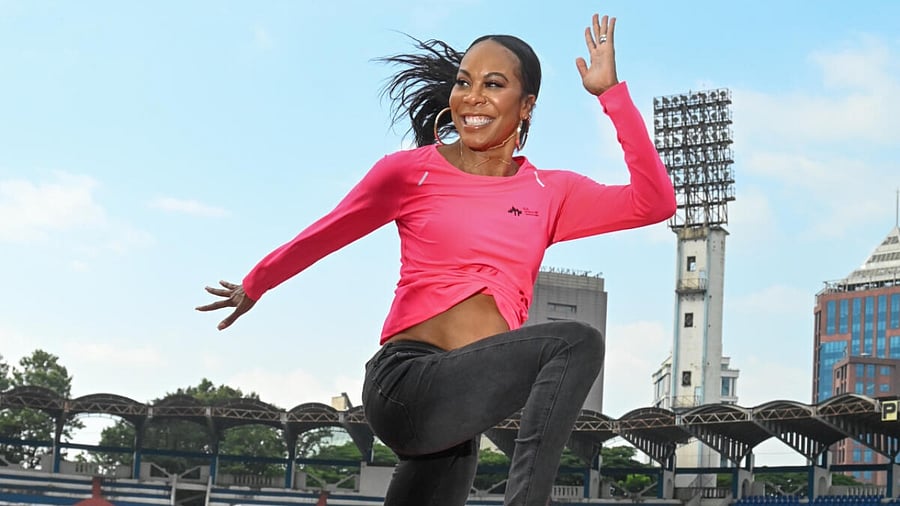
What started off as a dream to become a sprint queen, Sanya Richards-Ross ended up as the most decorated 400m female athlete of all time.
The Jamaican-born American, who is a former world champion and has five Olympic medals, is in Bengaluru as the international brand ambassador of the TCS World 10K run to be held on May 21.
The 38-year-old, with an individual 400m gold (2012 London Olympics) and a bronze (2008 Beijing) besides winning a hat-trick of golds in the 4x400m relay (2004 Athens, 2008 Beijing, 2012 London), shares her journey that began in Kingston as a seven-year-old before migrating to the USA aged 12 where her dreams took wings. Excerpts:
Why did you choose the 400m as your pet event?
It was the other way around. The 400m picked me! I started out in the 100m and 200m and really wanted to be a sprinter and had a lot of success in these two events both at high school and college. It was in my senior year at high school when my dad said to me ‘let's run a few 400m to get stronger in the 100 and 200’. That’s when I broke the indoor and outdoor 400m records. After that, it felt like a natural fit to me and I went on to have so much success.
How do you describe the 400m event in athletics?
I think it is the ultimate test of speed and endurance that challenges you mentally and physically. I think it takes a certain kind of athlete to run this event because you can get it so right or so wrong. To get out hard, get the pace over the back stretch, make the turn to come into the last 100... is not easy.
Which of the five Olympic medals is most special?
There are two that are really meaningful - the 400m individual medal in London meant the world to me because this came after the 2008 season when I was undefeated but didn’t win that one race in Beijing. That was a very hard pill to swallow after wanting to be an individual champion all my life. Also, in the same Olympics when we won the relay gold, where I came from behind to catch the Russians and bring my team to gold. That moment was also special for me. Those would definitely be the top-2 but all Olympic medals are sweet.
Your road to individual gold from the disappointing bronze in 2008.
Going through an abortion just before the Beijing Olympics affected me mentally. That does not take away anything from Christine Ohuruogu who ran a great race. It was when I realised that I need to get back to the joy of just running and not about the records or other noise. I went back to the drawing board and 2009 was one of my best seasons not just because I became a world champion but I felt light again and the fun I was having competing in the sport again. I pulled my hamstring in 2010 and 2011 was about overcoming the injury. I told myself in 2012 that this was my year and stepped it up in training, visualising being an Olympic champion. Though there were a lot of ups and downs, I made it happen. Finally!
Your take on the importance of mental health.
There was no focus on mental health when I was competing. People assumed that being an athlete meant being strong and we know how to balance physical and mental well-being. After the 2008 loss, my coach (who didn't know what I was going through) asked me if I wanted to see a sports psychologist. That changed my life and my sporting career.
What are your thoughts about IOC banning on transgender athletes from competing with women athletes?
That’s such a tough subject. I’m always very careful with how I approach this topic because it’s no one's fault. However, these men and women identify themselves, they should have a place in sport. I just think the tricky part is that, as far as my experience goes, the main difference between men and women sports is the testosterone levels. And that is what gives men an advantage over women. And so it becomes challenging for cis women to compete against trans women who have higher levels of testosterone. Obviously you want it to be a fair playing field for all. My hope is that we can find a fair way for everyone to compete.
India has its first Olympic champion in athletics that has brought about a change. What do you think we need to do to put more of our athletes on international podiums?
First of all, for young people, it’s hard to be something that you haven’t seen. I know in countries like India, sport is more of a spectator sport than as much participation, especially athletics. But now that kids can see people who look like them doing incredible things it serves as a catalyst for them to dream big. As a country and community, you need to find ways to get young people out and compete, fall in love with sports, and invest in coaching.
What are you looking forward to on Sunday with 27,000 people running?
Running has something special about it. And to see 27,000 people taking part on Sunday, it’s going to be inspiring for everyone there. I was an Olympian running in my own lane but I ran a 5K last year and it was magical. It will be exciting to see someone run their first race or their 100th. Hopefully that will inspire other people to incorporate fitness into their lives.
